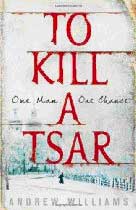
|
|
TO KILL A TSARAndrew WilliamsJohn Murray £16.99hbk/£12.99 trade paperbackReleased: 8TH July 2010Reviewer: Calum Macleod |
|
Calum MacLeod is a reporter for the Inverness Courier and had been writing for SHOTS since its early days. In 2009 the Highland and Islands Media Awards' judging panel awarded him “Highly Commended Feature Writer of the Year”. |
|
Russia, that mystery
inside an enigma to misquote Churchill, seems to exert a strong pull on
the imagination of crime writers in the west from R. N. Morris’s
Dostoevsky inspired series and Tom Rob Smith’s exploration of the
paranoia and secrets of Stalin’s workers’ paradise, all the way back to
Joseph Conrad. With Andrew Williams’ second book, we are back in Imperial days and territory familiar to both Dostoevsky and Conrad as revolutionaries sacrifice all to change the hated repressive system by any means necessary and no matter the cost to themselves. Caught up in their conspiracies is Anglo-Russian doctor Frederick Hadfield, torn between his family’s ties to the Imperial court and his attraction to beautiful revolutionary Anna Kovalenko and the aims of her group, the People’s Will, if not its methods. Williams has done his homework and each setting rings true from the glittering ballrooms of the Russian aristocracy and gentile drawing rooms of the “English Embankment” (though I feel honour bound to point out most of these Anglo-Russians are actually Scottish-Russians) to the safe houses where the earnest revolutionaries plan the death of Alexander II to the interrogation cells where their fate is sealed. Williams is even handed in his sympathies too. Both the plotters and their main antagonist the wily investigator Dobrshinsky, a man with secrets of his own, are well drawn, complete with their flaws and virtues. Because Williams book follows closely historical events, anyone with a grasp of Russian history will know the outcome (though perhaps after Tarantino’s “Inglourious Basterds“ all bets are off when it comes to assassination attempts on real-life figures). It also means Hadfield is ultimately a rather ineffectual hero, flowing along with events with little power or opportunity to alter the fate of the Tsar or those who plan to kill him. But this is such a well constructed period thriller you will hardly notice as you get as caught up in conspiracy and counter-plot as Hadfield himself.
|

| Page By Gary Cane [Contact] | ||
| Webmaster: Tony 'Grog' Roberts [Contact] |